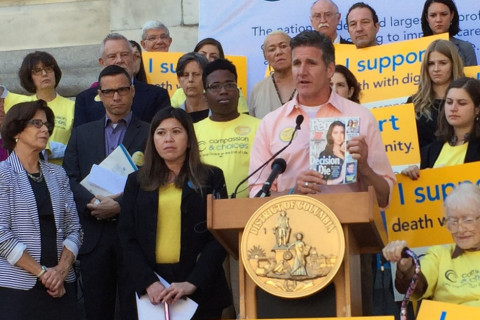WASHINGTON — It’s a controversial bill that would allow terminally ill D.C. residents to end their lives. And it needs congressional approval to become law.
Meanwhile, Mary Klein who is living with terminal ovarian cancer waits. She hopes Congress will affirm D.C. lawmakers’ vote that she have the right to die on her own terms.
“There’s a huge amount of anxiety around having an excruciatingly painful and not-dignified death. It’s an anxiety my wife feels, and so do my close friends,” she said.
Klein was diagnosed two years ago with advanced ovarian cancer. Following a radical surgery and treatments that routinely landed her in the hospital, Klein and her doctor recently decided her body could use a break. Now, her cancer has returned.
“My perspective has changed. And I think anyone who has faced death feels this; you have this incredible appreciation of everything you love,” Klein said.
Klein was one of many residents, both for and against, who lobbied D.C. council members ahead of the council’s Nov. 15 final 11-2 vote on the Death with Dignity Act.
The bill would allow terminally ill patients over 18 years old, with six months or fewer to live, to request lethal medication from their doctors.
A Gallup poll released in May 2016 found nearly seven in 10 Americans say doctors should be legally allowed to assist terminally ill patients to end their lives — up 10 percentage points from 2015.
Ahead of the November council vote, Councilmember Mary Cheh, of Ward 3, a sponsor of the bill, described the protections in the bill that require specific amounts of time to elapse during the process to prevent coercion of ill residents by a third party to end their lives.
Klein said she isn’t afraid to die, but does not want to lose herself to pain before life lets her go. When her doctor gives her six months to live, Klein plans on applying for the life-ending medication.
“I can’t tell you if I would take it, because when you are so close to death, you only know at that time. But I have complete faith in myself that I will do the right thing,” she said.

As Klein holds tight to that faith, it is in D.C. congressional delegate Eleanor Holmes Norton’s hands to fight to make the D.C. Council’s votes stick.
“This is a matter of life and death. It’s up to the District to decide this matter,” she said.
But Holmes Norton expects that she will have an uphill battle defending D.C.’s autonomy to other members of Congress, who will be drawn in by the controversial nature of the issue.
“If there’s something that goes against their own political philosophy, they feel they are entitled to weigh in. And I feel I need to fight it,” she said.
While it’s early in the new Congress and the committees have yet to take form, D.C.’s Death with Dignity bill is expected to be introduced this month.
The D.C. Council projects that the bill will become law on February 28, if the House and Senate do not pass a disapproval resolution and the president-elect does not sign it into law.








